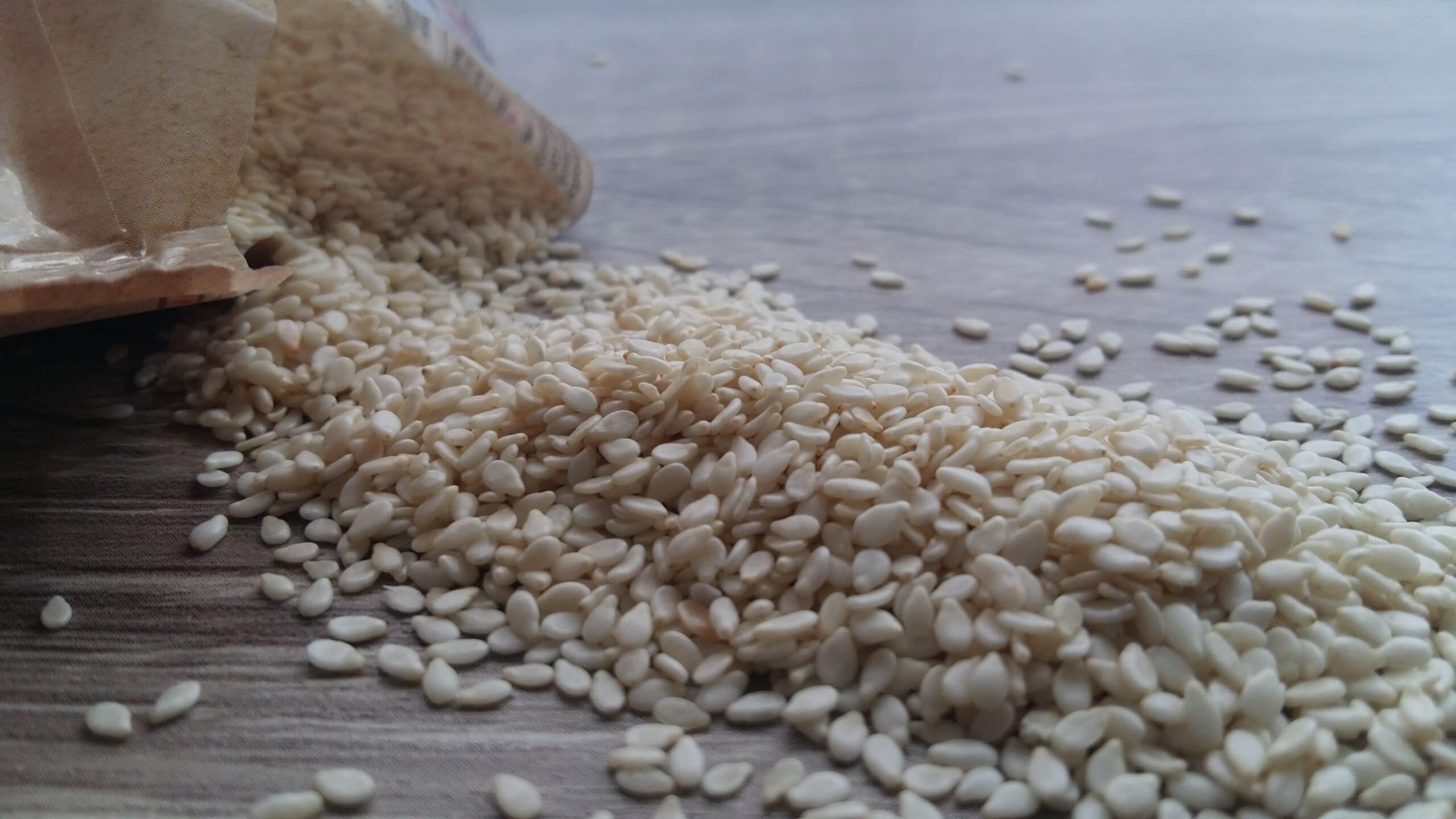VET APPROVED

The information is current and up-to-date in accordance with the latest veterinarian research.
Learn more »Click to Skip Ahead
Recently, sesame seeds have become a popular ingredient in dog treats and meals, but the question remains, are they safe for dogs to eat? Yes, sesame seeds are safe for dogs to consume. In this article, we’ll explore the nutritional value and health benefits of sesame seeds for dogs, possible side effects, precautionary measures, and other healthy snacks for dogs.

What Are Sesame Seeds?
Sesame seeds are tiny, oil-rich seeds that come from the Sesamum indicum plant. They are a rich source of nutrients such as protein, fiber, healthy fats, vitamins, and minerals. Sesame seeds are also packed with antioxidants, which help protect the body against free radicals that can cause cell damage and disease.

Are Sesame Seeds Safe for Dogs?
Sesame seeds are generally considered safe for dogs to eat. Sesame seeds are a good source of protein, fiber, and healthy fats. They’re also rich in vitamins and minerals such as iron, magnesium, and zinc. These nutrients are essential for maintaining a healthy immune system, strong and functional muscles, and a shiny coat. Sesame seeds also contain lignans, sesamin, and sesamolin; which have been shown to have anti-inflammatory and neuroprotective effects.
However, it’s important to note that dogs have different nutritional needs than humans. While sesame seeds can be a healthy addition to a dog’s diet, they definitely shouldn’t be consumed in excess.

The 3 Possible Benefits of Sesame Seeds for Dogs
Sesame seeds have several potential health benefits for dogs. As mentioned earlier, they’re a good source of essential nutrients such as protein, fiber, and healthy fats. But here are some of the other health benefits of sesame seeds for dogs:
1. Promotes Healthy Skin & Coat
Sesame seeds contain healthy fats that help keep your dog’s skin moisturized and their coat shiny. They also have vitamin E, which is a powerful antioxidant known to promote healthy skin.

2. Possible Neuroprotective Effect
Sesame seeds contain antioxidants, which are essential reducing the risk of diseases. The lignans in sesame seeds also have anti-inflammatory properties, which help reduce inflammation in the body and promote overall health. The abundant lignans found in sesame are called sesamin and sesamolin, which studies have found to have neuroprotective properties on gerbils. While there are no specific studies that prove these same properties apply to dogs, it is a possibility.
3. It May Reduce the Risk of Cancer
Studies performed in human and animal cells in vitro have discovered that the lignans found in sesame seeds can reduce metastasis and induce the destruction of defective cells. These properties may help to lower the risk of certain types of cancer. While more research is needed in this area, sesame seeds have shown promise in reducing this highly common health problem in dogs.

Possible Side Effects of Sesame Seeds for Dogs
While sesame seeds have several potential health benefits for dogs, they also come with possible side effects. Here are some of the side effects to look out for:
Digestive Issues
Sesame seeds are high in fiber, which can be difficult for dogs to digest if consumed in large amounts. This can lead to digestive issues such as diarrhea, vomiting, and gas.
Allergic Reactions
Like any other food, some dogs may be allergic to sesame seeds. Signs of an allergic reaction can include itching, swelling, hives, and difficulty breathing. So, if your dog shows any of these signs, stop feeding them seeds immediately and seek veterinary attention.
Antinutrients Content
While having some nutritional benefits sesame seeds contain oxalic acid and phytic acid, both considered antinutrients because they bind to and reduce the body’s ability to absorb certain nutrients. If consumed in excess, they can affect the digestion and absorption of mineral elements and proteins in the gut while increasing the risk of developing kidney stones.
Excessive Calories
Another important consideration about sesame seeds is that due to the high amount of oils, these tiny seeds pack large amounts of calories that can quickly add up and result in your dog packing up some unnecessary extra pounds.

Recommendations for How to Feed Dogs Sesame Seeds
If you decide to add sesame seeds to your dog’s diet, it’s important to do so sparingly and only in moderation. So, if your treat calls for some sesame seeds or you wish to sprinkle half a teaspoon in your medium-sized dog’s food it should be ok, but there is no need or reason to offer this regularly. It’s also good to monitor your dog’s reaction to sesame seeds. If your pup experiences any digestive issues or allergic reactions, stop feeding them sesame seeds immediately.

Precautionary Measures to Take Before Giving Your Dog Sesame Seeds
Before adding sesame seeds to your dog’s diet, it’s best to take some precautionary measures to ensure their safety. Here are some of the measures to take:
1. Consult With Your Veterinarian
It’s best to reach out to a vet before adding sesame seeds to your dog’s diet. They can advise you on the appropriate dosage and whether sesame seeds are suitable for your dog’s specific needs.
2. Choose High-Quality Sesame Seeds
Always try to buy high-quality sesame seeds. This means seeds that are free from additives, preservatives, and other harmful chemicals. Organic, non-GMO sesame seeds are the best option.
3. Monitor Your Dog’s Reaction
Always check your dog’s reaction to sesame seeds. If they show any signs of allergic reactions or digestive issues, stop feeding them sesame seeds immediately and seek veterinary attention.


Wrapping Things Up
Sesame seeds can be a good addition to add some variability of flavors to your dog’s treats or diet, provided they’re given in moderation and after taking necessary precautions. While they’re packed with essential nutrients and have several potential health benefits, they also come with possible side effects. But before feeding your dog sesame seeds, it’s best to consult with your veterinarian before adding sesame seeds to your dog’s diet and to monitor their reaction over the next few minutes and hours to ensure that they aren’t lethargic, nauseous, or displaying any other signs of illness.
See also:
- Can Dogs Eat Anise Seed? Vet-Approved Benefits & Risks
- Can Dogs Eat Sunflower Seeds? Vet Approved Nutrition Facts & FAQ
Featured Image Credit: JumpStory












